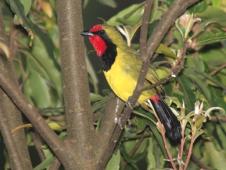
In early 2007, the Ugandan Government proposed that about one-third of Mabira Forest Reserve should be converted to sugarcane for biofuels production. A campaign by Nature Uganda (BirdLife in Uganda) and others galvanised public support to lobby against the plans. This led to the government and the private company withdrawing their proposed plans in October 2007, thereby retaining the natural forests that support rich biodiversity and deliver valuable ecosystem services.
In early 2007, the Ugandan Government proposed that about one-third of Mabira Forest Reserve (30,000 ha), an Important Bird Area, should be converted to sugarcane for biofuels production. With over 300 bird species and nine species of primates (including a recently identified mangabey subspecies Lophocebus albigena jonstoni), this was a severe threat to Uganda’s biodiversity.
In response, Nature Uganda (BirdLife in Uganda), together with other civil society organisations, organised a campaign entitled ‘Stop the give-away of Mabira Forest Reserve’. To convey how important it was to retain the forest in its pristine state, Nature Uganda commissioned a wide-ranging economic study (Byaruhanga 2007). The value of the wood was estimated to be worth US $316 million by the National Forest Authority (NFA). However, the forest captures carbon worth US $212 million annually. It also delivers important ecosystem services, especially as a water catchment area for Lake Victoria, Lake Kyoga and the Nile River. It is the source of many other commodities, such as food and medicines, that support the livelihoods of local communities. And, it attracts tourists that contribute 62% of the total revenue collected from visitors to Uganda’s Forest Reserves (and ecotourism is now Uganda’s second largest foreign exchange earner).
Nature Uganda and other civil societies lobbied the government departments, including the NFA, ministers and legislators, and organised a demonstration in September 2007 which led to the withdrawal of the proposed plans in October 2007. This shows what it is possible to achieve when civil society works with the general public, local communities and legislators to galvanise both social and political will.
Related Sites
Links
References
Compiled: 2008
Recommended Citation:
BirdLife International (2008)
Campaign to save Mabira Forest in Uganda from sugarcane plantation for biofuels.
Downloaded from https://datazone.birdlife.org/sowb/casestudy/campaign-to-save-mabira-forest-in-uganda-from-sugarcane-plantation-for-biofuels on 20/12/2024